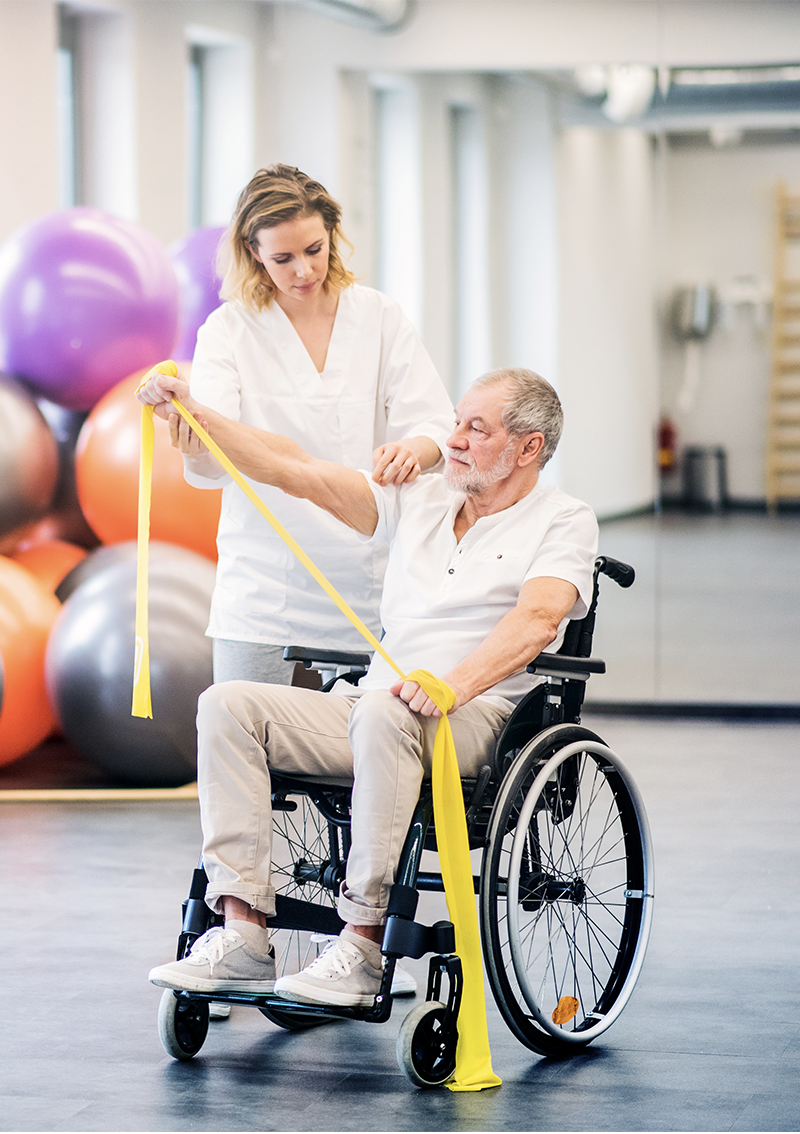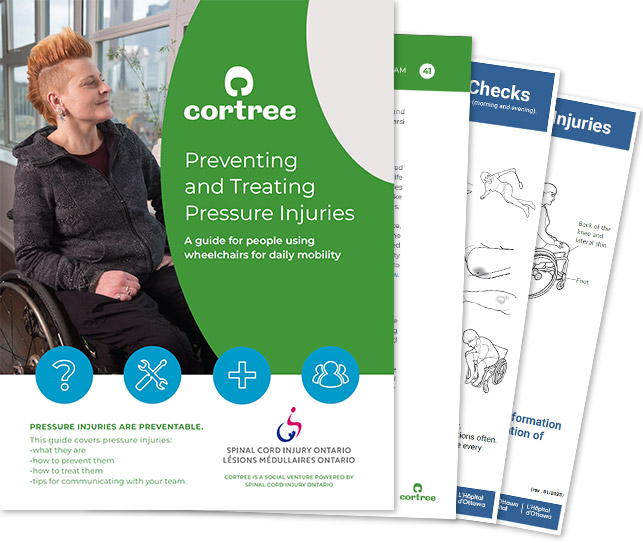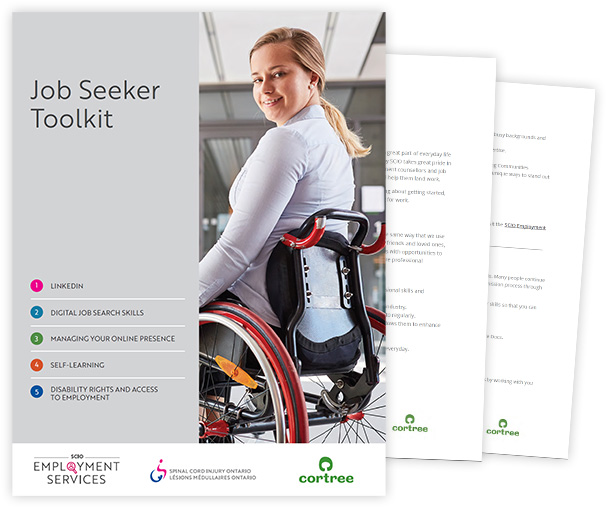
Chronic Pain Clinic
Cortree Can Help You Understand Chronic Pain Clinics
This Page Will Cover:
Living with a disability can be challenging, especially when your condition requires daily chronic pain management. Regardless of your condition, if you’re looking to get a better understanding of chronic pain, or methods for improving accessibility in your life, Cortree is here to help.
This page will help you learn about how chronic pain is diagnosed, chronic pain clinics and their comprehensive pain management programs, techniques for chronic pain management, as well as whether pain clinics are covered by OHIP.

How is Chronic Pain Diagnosed?
Chronic pain is different from pain experienced right after an injury. When pain lasts more than six months it changes how pain is experienced in the nervous system.
Chronic pain may be related to medical conditions like multiple sclerosis, spinal cord injury or cancer, or it may be due to previous injury or arthritis.
Your doctor will work with you to determine a potential reason for your chronic pain. Usually, this will take the form of questions, an examination and additional tests (if necessary). Even if a specific reason is not found (and often there is no reason found) this assessment is important for your doctor to understand your pain, and to work with you in order to develop a plan that may help.
Your doctor will ask you questions about your pain such as:
- Asking you to rate your pain from zero to 10, where zero is no pain and 10 is the worst pain
- Asking you where the pain is located, what it feels like, what makes it better or worse
- Asking you what makes your pain flare up, and how long a flare up lasts
These questions help you and your health care team determine how much the pain is interfering with your life, how it changes over time, and whether the treatments are working.
What Are Chronic Pain Clinics?
Chronic pain clinics, also sometimes called pain management clinics, specialize in helping you learn pain control techniques that you can apply in your daily life. They can also assist with any medications or injections that you may need help administering.
Different regions have different clinics and self-management programs available, with different areas of focus and interdisciplinary teams. Once you are referred to a chronic pain clinic they will provide you with information and education. This is usually followed by an in-depth assessment and treatment plan that they will communicate to your family doctor. Additional services, including wellness promotion, access to therapies, access to specialized treatments, follow-up care and prescription monitoring may be provided depending on your situation.
Depending on where you live, a specialized pain clinic may be difficult to access. Virtual care and telehealth are becoming more common, and more people are becoming more comfortable with this technology. This may be an option if you cannot easily access a pain clinic.
If you think this service would benefit you, we encourage you to speak with your doctor about pain management clinics in your area. Other programs and specialists may also provide assistance for this if you are living with a disability and chronic pain. Your doctor can assist you with finding a program that is right for you.
Chronic pain clinics, also sometimes called pain management clinics, specialize in helping you learn pain control techniques that you can apply in your daily life. They can also assist with any medications or injections that you may need help administering.
Different regions have different clinics and self-management programs available, with different areas of focus and interdisciplinary teams. Once you are referred to a chronic pain clinic they will provide you with information and education. This is usually followed by an in-depth assessment and treatment plan that they will communicate to your family doctor. Additional services, including wellness promotion, access to therapies, access to specialized treatments, follow-up care and prescription monitoring may be provided depending on your situation.
Depending on where you live, a specialized pain clinic may be difficult to access. Virtual care and telehealth are becoming more common, and more people are becoming more comfortable with this technology. This may be an option if you cannot easily access a pain clinic.
If you think this service would benefit you, we encourage you to speak with your doctor about pain management clinics in your area. Other programs and specialists may also provide assistance for this if you are living with a disability and chronic pain. Your doctor can assist you with finding a program that is right for you.
Comprehensive Pain Management Programs
Because pain is complex, multidisciplinary treatment is often needed. Strategies like medications, physiotherapy, exercise, alternative medicine and surgery can all be part of your plan. Your doctor may recommend that you enroll in a chronic pain management program. These are programs that are focused on rehabilitation for people with chronic pain.
Your health care team can work with you to discuss your treatment options. It may take a while and some trial and error to find what chronic pain management strategies work best. Having a support team that understands what you’re going through can make a huge difference. Knowing where to go for help when you need it is important. Your family doctor is a good place to start.
If you’d like to learn more about chronic pain relief, you can visit our page here.

Chronic Pain Management Techniques
Finding the right chronic pain management techniques often involves trial and error to find what works best for you. It is important to talk with your health care team about your preferences, options, and the potential risks and benefits of any treatments you are considering.
When most people think about pain control, the first thought that comes to mind are pain medications. While these are important tools for helping patients to manage pain, there are many other chronic pain management techniques.
Physical treatments like exercise, massage, manual therapy, acupuncture and heat can also help with pain control. For people with spinal cord injuries, a treatment called TENS or Transcutaneous Electrical Nerve Stimulation may help reduce some pain after spinal cord injury.
Surgery for management of chronic pain is not common and is usually only considered when other treatments haven’t worked.
Psychological and mind-body therapies can help to address the contributing factors to pain – the things that dial your pain up and down. Some examples include Cognitive Behavioural Therapy, Biofeedback, Visual Imagery and Hypnosis.
Treatments for substance use, depression, anxiety and post-traumatic stress disorder may also play a role in pain management.
Among people with chronic pain, mindfulness interventions have been shown to decrease anxiety, depression and distress, as well as enhance quality of life. Using meditation for pain management is a technique that anyone can try, without requiring prescriptions or medical assistance. Meditation can be done from the comfort of your home, as well; making it a very convenient option, if it works for you.
If you’d like to learn more about chronic pain management, you can visit our page here.

Are Pain Clinics Covered by OHIP?
If you’ve been wondering whether pain clinics are covered by OHIP, the answer is yes. However, you must be referred by a doctor or nurse practitioner.
Also, you will need to make sure that you bring your health card to your first appointment.
Access All of Cortree’s Useful Resources
Cortree has a variety of helpful resources to help you or your loved ones live better with chronic pain.
All you have to do is sign up today, and you’ll be able to access all of Cortree’s resources online.
Chronic pain can be hard to live with and difficult to treat, but that doesn’t mean to have to manage it alone.

